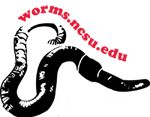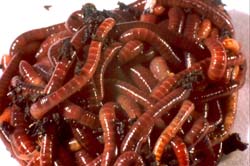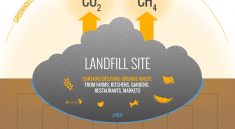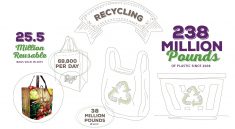Vermicomposting NC State Extension, Process of earthworms and microorganisms stabilizing active organic materials and converting to valuable soil amendment and source of nutrients
NC State Extension.
“Vermicomposting
 Vermicomposting is a process that relies on earthworms and microorganisms to help stabilize active organic materials and convert them to a valuable soil amendment and source of plant nutrients. Earthworms will consume most organic materials, including food preparation residuals and leftovers, scrap paper, animal manure, agricultural crop residues, organic byproducts from industries, and yard trimmings. This website provides cooperative extension agents, interested stakeholders and the general public with information and resources to vermicompost organic materials generated by farms, institutions, businesses and households.
Vermicomposting is a process that relies on earthworms and microorganisms to help stabilize active organic materials and convert them to a valuable soil amendment and source of plant nutrients. Earthworms will consume most organic materials, including food preparation residuals and leftovers, scrap paper, animal manure, agricultural crop residues, organic byproducts from industries, and yard trimmings. This website provides cooperative extension agents, interested stakeholders and the general public with information and resources to vermicompost organic materials generated by farms, institutions, businesses and households.
- Earthworm Facts
- Worms & Worm Bins
- For Households
- For Schools
- For Businesses, Farms, Institutions, Municipalities
- Composting Website
The Importance of Vermicomposting Today
 Up to 75 percent of what is discarded by North Carolina’s communities and businesses are organic materials. Instead of disposing of food scraps, yard wastes, and other organics, the materials can be vermicomposted. This method of recycling converts organic materials that have traditionally been viewed as waste into a valuable soil amendment for plants and crops. When vermicompost is added to soil, it boosts the nutrients available to plants and enhances soil structure and drainage. Vermicompost has also been shown to increase plant growth and suppress plant disease and insect pest attacks.
Up to 75 percent of what is discarded by North Carolina’s communities and businesses are organic materials. Instead of disposing of food scraps, yard wastes, and other organics, the materials can be vermicomposted. This method of recycling converts organic materials that have traditionally been viewed as waste into a valuable soil amendment for plants and crops. When vermicompost is added to soil, it boosts the nutrients available to plants and enhances soil structure and drainage. Vermicompost has also been shown to increase plant growth and suppress plant disease and insect pest attacks.
“Vermicompost products have many applications, including home gardening, landscaping, turfgrass, golf courses, viticulture, DOT projects, use in potting soil for the horticultural industry, and in agriculture. Vermicomposting may also be used to help solve North Carolina’s hog waste problems.””
“Rhonda Sherman is an extension specialist in the Department of Horticultural Science at NC State University, providing leadership for university outreach programs on solid waste management issues through the Cooperative Extension Service. She holds degrees in Environmental Studies and Urban/Regional Planning, and Environmental Resources Analysis with an emphasis in solid waste management.
Rhonda’s areas of expertise are vermicomposting, composting, recycling and waste reduction. She gives 30-40 presentations annually and has authored a variety of publications on these topics. She is considered one of the leading authorities on vermicomposting and has received requests for information from people in 109 countries. Rhonda organizes and runs an annual conference on large‐scale commercial vermicomposting that draws participants from all over the world. Her 18th Vermiculture Conference will be held in 2017. Each year, people from about 27 U.S. states attend the conference in addition to participants from 5-7 foreign countries (past participants came from Argentina, Australia, Belgium, Canada, China, Dominican Republic, Greece, Guatemala, Hong Kong, India, Israel, Latvia, Mexico, Nigeria, Norway, Philippines, Micronesia, Puerto Rico, South Africa, Switzerland, Thailand, Turkey, and Uganda). Testimonials: “The conference was definitely worth the time and money. I learned so much…not just about earthworms, but soil composition, minerals, testing, teas, diseases, correct processes to follow, etc. I’m looking forward to next year’s conference already!” ~S.S., North Carolina; “Count me as an extremely satisfied conference attendee. I was truly impressed and hope to be one of your “frequent fliers.” I was particularly impressed with the depth of the science presented.” ~S.F., New York
Rhonda has a two‐acre Compost Learning Lab (CL2) at The Lake Wheeler Road Field Laboratory. The CL2 has a 40‐ft by 30‐ft building (Worm Barn), an equipment shed, and a covered teaching shelter. There are 25 types of composting and vermicomposting bins and areas for hands‐on training activities. Flowerbeds, fruit trees, and native trees/shrubs/grasses are being installed and research areas are being developed.
Rhonda co‐founded the North Carolina Composting Council (NCCC) and is their most recent past-president. She was formerly a member of the Board of Directors of the U.S. Composting Council and a contributing editor to BioCycle Journal of Composting and Organics Recycling.”
https://composting.ces.ncsu.edu/vermicomposting-north-carolina/




